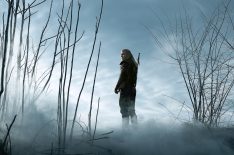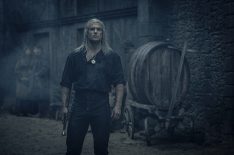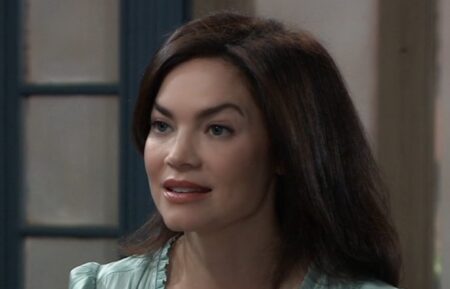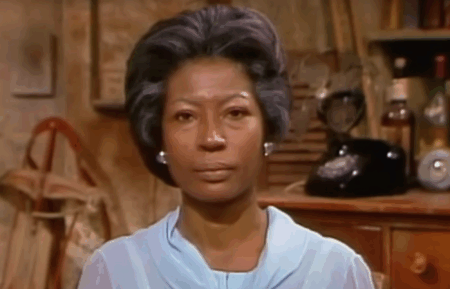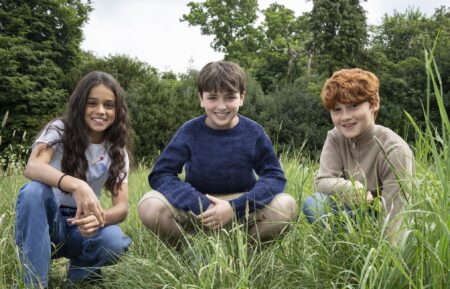‘The Witcher’ Episode 2 Digs Deep Into the Show’s Mythology (RECAP)
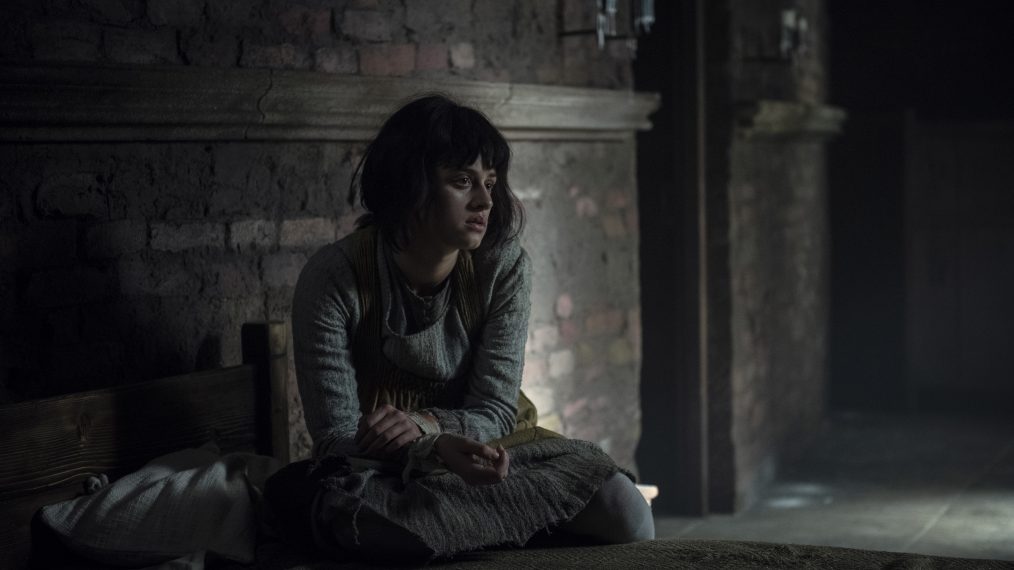
Spoiler Alert
[Warning: The below contains MAJOR spoilers for The Witcher Episode 2, “Four Marks.”]
I praised the first episode of The Witcher for its efficiency in introducing the main characters and plot points while still managing to be an entertaining hour of fantasy frolics. For the most part, it was straightforward enough for a newcomer like myself to grasp what was happening. The second episode, “Four Marks” (written by Jenny Klein), is a whole different beast — there is a lot to take in here in terms of character, lore, and mythology.
Yet, despite all the complex history and obscure references, “Four Marks” is still a thoroughly engaging episode — in large part due to the pacing and structure of Klein’s script, which skillfully reveals centuries worth of mythology without ever getting lost in the fiddliness of all it. This is achieved by splitting the narrative into three separate story-threads, each one led by a different character. Where the episode succeeds is in weaving these threads together, not just thematically but narratively — each story helps broaden the Witcher universe.
Let’s start with the newest character, Yennefer (Anya Chalotra), a penniless young farm girl with kyphosis — a physical disorder that causes a curvature of the spine. Yennefer spends her days sludging through pig dirt, being bullied, beaten, and abused. Chalotra delivers a great, sympathetic performance. Yennefer is considered an outcast, a freak, the “crooked girl” whom nobody could ever love. Even her own family want rid of her, and when she shows an aptitude for magic, her step-father has no hesitation in selling her to a witch for a paltry four marks.
In a way, Yennefer shares similarities with Princess Ciri (Freya Allan), who also lost her family, albeit under much different circumstances. Ciri’s family loved and protected her, and they were only separated via death, whereas Yennefer’s family essentially abandoned her. But beyond the loss of family, Yennefer also shares Ciri’s propensity for magic, and much like the runaway princess, she doesn’t yet understand her powers. Her ability to teleport herself (referred to as “portalling”) seems almost accidental, induced by fear rather than choice.
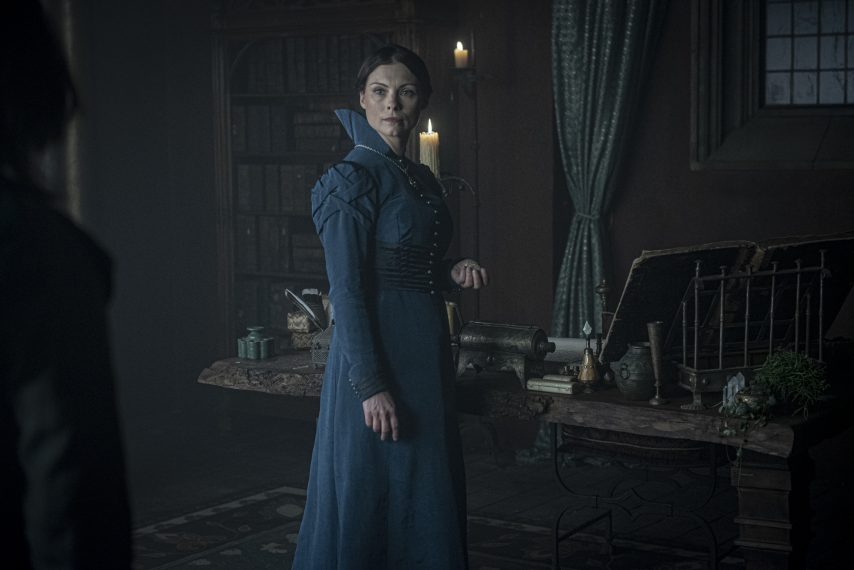
Netflix
Yennefer’s story is basically a lost installment of Chilling Adventures of Sabrina. She is taken in by Tissaia de Vries (MyAnna Buring), a powerful sorceress who runs a Witch Academy at Aretuza. It’s here where Yennefer and other young girls are taught how to harness their powers in a series of tests, including levitation, telepathy, and even catching lightning in a bottle. “Magic is organizing chaos,” Tissaia explains. But Yennefer struggles to keep up with her classmates and lashes out in ways that are harmful to both herself and others. At one point, she attempts to kill herself by cutting her wrists. “Your job is to control chaos, not become it,” Tissaia tells the self-destructive farm girl.
Through all this, Yennefer is guided by Istredd (Royce Pierreson), a sorcerer she meets when she portals to The Tower of the Gull, an old building at Aretuza. Istredd is impressed by the Yennefer’s powers and encourages her not to give up. For the first time in her life, Yennefer feels like there is somebody who actually cares about her, that could maybe even love her one day. Istredd’s support gives her the confidence to continue, and she eventually ends up impressing Tissaia. Although, Istredd’s tittle-tattle chat with Master Stregobor (Lars Mikkelsen) suggests he is not being entirely honest with Yennefer.
It’s through Istredd, though, we learn about the continent’s past, specifically, the history of elves. The big talking point running through the episode is to do with the elven people: who they are, what they did, and where they are now. According to Istredd, the elves were the original sorcerers, before humans and monsters ever roamed the continent. It was the elven mages that taught the first humans how to turn chaos into magic. In return, the humans slaughtered the elves, so that they could pretend the power always belonged to them.
“Rewriting history with the stories we tell, the songs we sing about our own triumphs, it’s what we do,” Istredd tells Yennefer. Humans reshaped history to paint themselves as the good guys, to justify their actions, rather than admit they brutalized an entire race. Yennefer empathizes with the plight of the elves, in a deeper way than we first realized. It turns out her father was a half-elf who was killed in the Great Cleansing (where humans wiped out thousands of elves). “It’s his blood why I’m cursed with a twisted spine,” she says. “Why I’m only worth four marks…. why I’ll never be loved.” This scene brings everything into focus, explaining not only Yennefer’s abilities, but demonstrating how those in power can rewrite history.
Istredd’s elf history lesson is very different from the one we learn in Ciri’s story. Still on the run from the Nilfgaard army, the disheveled princess bumps into a young lad in the woods. For now, we shall refer to him as Rat Boy (Wilson Radjou-Pujalte), seeing as that’s what Ciri calls him after he catches and cooks a rodent for them to eat. Ciri and Rat Boy stumble upon a camp set up by the people of Cintra, though Rat Boy does not stick around to make his presence known. The camp is occupied by the lost and wounded families displaced after the Nilfgaard attack. Many of them are angry and upset at Queen Calanthe, so, of course, Ciri does not reveal she is the princess.
At the camp, Ciri meets Adon Ozol (Krisztián Csákvári), a young man who hopes to one day become a knight. Around his neck, Adon wears a necklace made of elf ears. He says he killed the elves while doing his part to avenge human lives lost in Filavandrel’s uprising — apparently, Filavandrel is King Elf, who once tried to claim Cintral land. Unlike Istredd’s story, according to Adon, elves are vicious, bloodthirsty scavengers. But Adon is still basically a child, are these just the stories his elders have told him? Does he have any idea that the land once belonged to the elves?
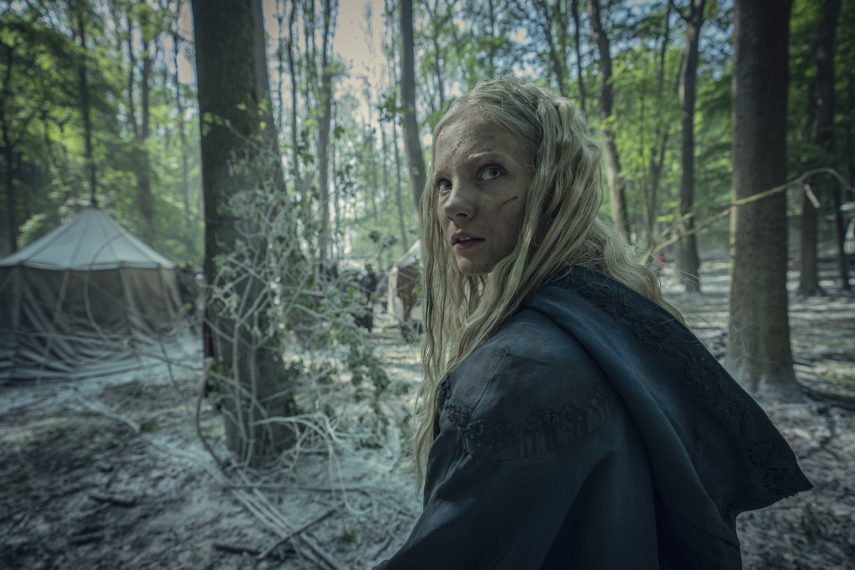
Netflix
Adon takes Ciri to meet his family, who are holed up in one of the tents. His mother, Lilja (Andrea M. Simon), has a deep hatred for the Queen, and, by all accounts, is not a very nice person. While she promises to look after Ciri, she treats those different from her very poorly, like Abbot (Sándor Köleséri), the little person she keeps as a slave. But Ciri doesn’t have much choice for protectors at this point. She tells Lilja she is looking for a man named Geralt, even though she doesn’t know who that is. And she also reveals that both her parents died when she was a baby. This is giving me major His Dark Material flashbacks, so I’m suspecting at least one of her parents is still alive.
Ciri isn’t safe for long, as the camp is ambushed in the middle of the night by the Nilfgaard. During the melee, Adon takes an arrow to the chest, and Abbot gets his revenge on Lilja by mercilessly stabbing her to death in front of Ciri. Luckily, Rat Boy returns to usher Ciri to safety, and here is where everything is connected. Rat Boy removes his hat, revealing his ears, and we see that he is an elf. Initially, he looks scared to have accidentally unveiled his true nature. But Ciri is not angry or afraid. She doesn’t see a depraved savage as the tales tell, but rather a sweet boy who saved her life. “My name is Dara,” he tells her.
Geralt (Henry Cavill) also has a run-in with elves in a brilliantly fun side-mission. After being paid to dispose of a “devil” who has been stealing grain, Geralt is followed by Jaskier (Joey Batey), a lute-playing bard with a penchant for exaggeration. The bothersome bard is hoping his adventure with Geralt will provide some inspiration, as most of his current songs are tall-tales about “creatures that don’t exist,” according to Geralt. Jaskier’s irritating personality is the perfect contrast to the stone-faced, no-nonsense Witcher. It’s like a mini buddy-cop movie.
According to Jaskier, the elven-people willingly gave up their land and retreated to their “golden palaces” in the mountains. We soon learn that that is just another myth. Geralt and Jaskier are blindsided by a horned goat-man, named Torque the Sylvan (Amit Shah), in one of the funniest fight scenes I’ve seen on TV in a while. “Did your mother f*** a goat?” Geralt snaps at the beast. “Did your mother f*** a snowman?” Torque retorts as he rips out a chunk of Geralt’s white hair. You can hit me with all the mythology and lore you want if you continue to deliver scenes as entertaining as this one.
Anyway, Geralt and Jaskier are captured by elves and taken to one of their caves — and it’s certainly no golden palace. It turns out that Torque has been stealing grain on behalf of the elves because they were forced off their land by humans. The King Elf reveals himself to be the infamous Filavandrel (Tom Canton), once ruler of the Seven Towers, now merely the ruler of the Edge of the World. Filavandrel survived the Great Cleansing; he buried his loved ones in a mass grave; he has no hope nor desire for a reconciliation with humans. Again, Geralt’s advice is to leave, go somewhere else and rebuild. “Show humans you are more than what they fear you to be,” he says.
Geralt, like the elves, like Yennefer, knows what it’s like to be different, to be an “other.” He is a mutant, maligned and despised by the majority of human-kind. But he has learned to live with humans, “so I may live.” It’s because of this shared outsider mentality that Torque convinces Filavandrel to let Geralt go free, allowing Jaskier to pen a new tune. But even still, Jaskier can’t help but exaggerate the situation, singing of fighting elf armies and devil-horned monsters.
“That’s not how it happened. Where’s your new-found respect?” Geralt interrupts. “Respect doesn’t make history,” Jaskier states.
Additional Notes
- There’s some top banter between Geralt and Jaskier. “You smell of death and destiny. Heroics and heartbreak,” Jaskier says. “It’s onion,” Geralt deadpans.
- “Don’t touch Roach.” Seriously, you don’t come between a man and his horse.
- “There I go again, just delivering exposition,” Jaskier says at one point. I’m telling you, this show is very tongue-in-cheek, and it’s great.
- Also great, the punches to Geralt’s face in synchronicity with the lute sounds.
- I’ve got to say, I’m not quite sure what was happening when Tissaia turned those girls into eels and told Yennefer to push them into the water.
- I’m definitely going to have Jaskier’s “Toss a coin to your Witcher” song stuck in my head all through the holidays.
The Witcher, Season 1, Streaming, Netflix
From TV Guide Magazine
How 'Countdown' Recruited Jensen Ackles to Go Full 'Die Hard'
Countdown boss Derek Haas talks creating the character around Ackles, and the cast teases the “Avengers”-like team of the crime thriller. Read the story now on TV Insider.

